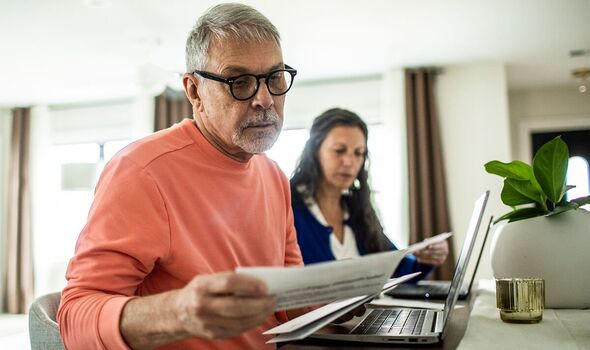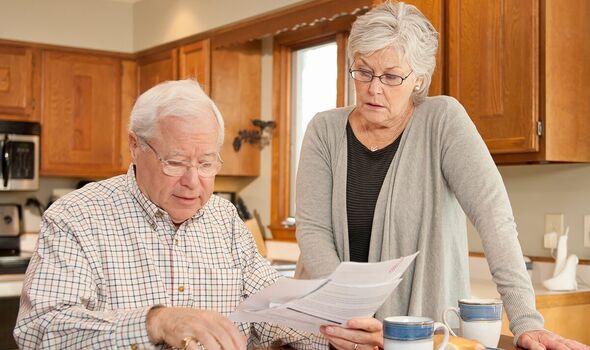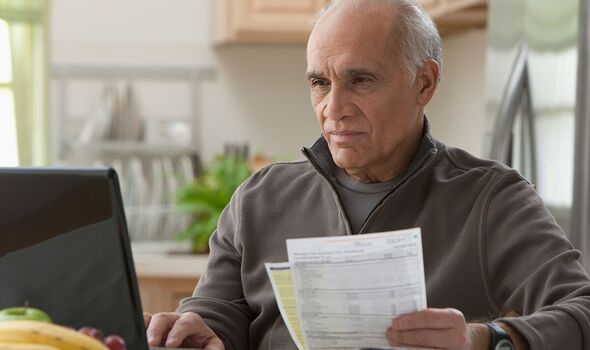The future of the triple lock is in doubt (Image: GETTY)
An advisor to the Bank of England has called for an alternative to the triple lock as he warns the current policy cannot last for much longer.
The triple lock guarantee ensures state pension payments increase each year in line with the highest of 2.5 percent, the rise in average earnings or inflation.
High levels of inflation throughout last year secured pensioners a record 10.1 percent which came into effect in April, and predictions from the Bank of England suggest inflation will be at seven percent in September, when the measure for the triple lock is taken.
Such large increases, combined with a growing number of Britons claiming the state pension, raises the question of how affordable for Government coffers the triple lock will be in the coming years.
Prime Minister Rishi Sunak said recently he is “committed” to retaining the policy but some analysts fear it is becoming unsustainable.
The future of the triple lock is in doubt (Image: GETTY)
Martin Hartley is group CCO of emagine Consulting and a member of the Bank of England decision-maker panel, a group of finance bosses which provides insight to the central bank about the pressures facing businesses.
He told Express.co.uk: “The triple lock policy doesn’t fairly reflect the needs of this group of people [state pensioners]. I believe the system needs to be reformed and can’t see it lasting much longer.
“We need to look at introducing a policy that investigates whether a person’s occupation is fit for purpose by looking at their general health and wellbeing. Something needs to change.”
The current full basic state pension is £156.20 a week while the full new state pension is £203.85 a week.
A person typically needs 30 years of National Insurance contributions to get the full basic state pension and 35 years of contributions to get the full new state pension.
The future of the triple lock is in doubt (Image: GETTY)
Mr Hartley spoke about some of the alternatives the Government could look at as a different metric for determining how much the state pension goes up each year.
He said: “A single lock policy is an approach that would involve using only one factor, such as inflation or average earnings growth, to determine pension increases.
“This would be a more suitable way of assessing the landscape and ensuring everyone is looked after.
“Another strategy is to adjust earnings. Instead of relying on average earnings growth, the Government could implement a policy that considers the connection between earnings and pensions, creating a more flexible system.”
Another option ministers may consider is a means-tested system. The advisor said: “Implementing a means-testing approach where pension increases are based on financial need would also be a way of managing pension entitlement.
The future of the triple lock is in doubt (Image: GETTY)
“Although there will be people who fall through the cracks, it seems like the fairest way to ensure those who need support will receive it.”
Express.co.uk asked other analysts for their views on the future of the triple lock. Edmund Greaves, co-editor of personal finance blog Mouthy Money, warned the policy is “patently unsustainable from a public finance, and generational fairness, perspective”.
He said: “While there are certainly many pensioners reliant on the payments for their day-to-day living, the vast majority have accrued decent levels of wealth over a lifetime.
“This leaves us in the toxic situation where younger working age people, who are generally worse off than pensioners, are paying for older people’s retirements without being able to save adequately for their own.
“Let’s be clear too that there is no state pension fund to drawn upon – it is paid for out of general taxation.
“I’m no fan of increasing taxes or creating new ones, but we’re now in a position where unless the state recoups some of the costs of the state pension from wealthier pensioners, then the inequality created by economic distortions in the triple lock rules are going to take us to a breaking point.”
However, Karen Barrett, CEO of Unbiased.co.uk, said the policy will remain in place for now as ministers are unlikely to make changes with the pressures of the cost of living crisis and the General Election looming.
She said: “While the Government switched to a double lock during the pandemic due to unusually high wage growth, this is unlikely to happen in the foreseeable future.
“Millions of pensioners are struggling to make ends meet and keeping the triple lock will offer a welcome boost to their finances.”
For the latest personal finance news, follow us on Twitter at @ExpressMoney_.











